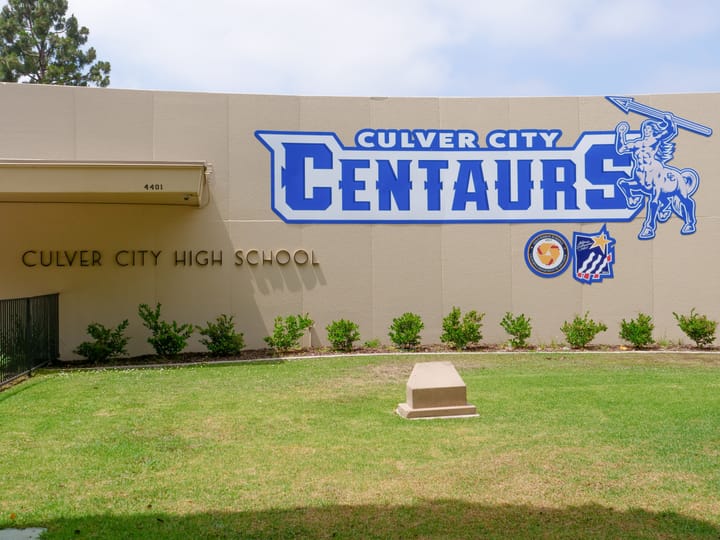Council approves conditional $2.5 million contribution to CCUSD
The conditions approved with the contribution Monday night are meant to ensure CCUSD can reach financial solvency without direct city support

In a 5-0 vote, the Culver City Council approved a $2.5 million conditional contribution to the Culver City Unified School District Monday night. This money will assist the District in efforts to balance its budget and minimize or prevent future cuts to positions and/or services at Culver City schools.
Several council members had previously expressed apprehension about making the move due to the city's precarious financial situation. To secure funding for this contribution, city staff compiled a list of 94 Capital Improvement Projects (CIP) that could be delayed or canceled to reallocate funds towards this contribution.
Concerns were partially alleviated by the conditions to be included in the agreement accompanying the contribution. The conditions are meant to ensure that CCUSD moves towards a path of fiscal responsibility and viability, and requires the District to do the following:
- Create a written plan on retaining students and marketing to residents
- Pursue the placement of a parcel tax measure on the June 2026 ballot
- Explore the possibility of developing affordable or market-rate housing on District property
- Allow a Finance Advisory Committee member on the District's Citizens' Bond Oversight Committee (CBOC)
- Provide regular reports on finances to the City of Culver City/Culver City Unified School District Liaison Committee
- Allow City staff to attend meetings between the Los Angeles County Board of Supervisors and CCUSD
The contribution approved Monday night is also a one-time payment, which represents a much shorter commitment than the three annual payments suggested when the item was first brought to council last month.
Representatives from the school district, including CCUSD Board of Education members and new District superintendent Dr. Alfonso Jiménez, spoke at the meeting to explain why this funding was necessary for Culver City schools. Even with this money from the city, CCUSD will still need $1.5 million to avoid a budget deficit and the cuts the Board of Education would need to make to address it.
Significant reductions have already been made — including the elimination of 40 positions — which have resulted in a $4 million decrease in projected spending, Board of Education member Lindsay Carlson noted. She argued that additional cuts required without this contribution could trigger a downward spiral, which could have consequences beyond the classroom.
"If Culver City Schools no longer have a strong reputation, families like mine will not have a reason to continue living in Culver City," Carlson said. "My property value will decline, and so will yours."
No one wants to be in a position where they need to ask for money, Board of Education member Andrew Lachman told the council Monday. However, he argued that the Board needs time to implement measures to correct CCUSD's financial course.
"This Board has done a great deal to make sure that we are asking questions about our costs," Lachman said. "We can't undo the mistakes that were made in the past, but we can address them and make it better."
Many critics have pointed to previous school boards' mismanagement of funds, particularly the one-time funding related to COVID-19, as the primary drivers of the current deficit at CCUSD.
But those who believe the city is not supporting the District enough look towards nearby municipalities, particularly Santa Monica and Beverly Hills, which have significant agreements with their districts, either through joint use agreements or direct contributions.
According to Culver City Mayor Dan O'Brien, Santa Monica and Beverly Hills have "very unique budget advantages" over Culver City. These municipalities receive nearly twice the share of property tax revenue generated within their respective borders compared to Culver City, putting them in a position to contribute to their local districts.
Additionally, while joint use agreements in these cities are decisions made by their city councils, direct contributions in Santa Monica are through voter-approved means, such as 2022's Measure GS parcel tax revenue sharing measure and 2010's Measure YY sales tax revenue sharing requirement.
"City councils don't vote to direct General Fund money to their local school district," O'Brien said Monday night.
The apprehension surrounding the District's plans for financial solvency drove Mayor O'Brien's hesitancy to approve this contribution. As part of the agreement, O'Brien pushed for a condition requiring district staff to create a formal written plan to attract and retain students.
Both Lachman and Carlson asked the public to trust in the current Board of Education, with Carlson stating that the current configuration would make fiscally responsible decisions.
"Prior district management made some decisions that exacerbate the problems we face now," Carlson said. "The current district management and school board are dramatically more fiscally responsible."
Requirements to explore other revenue-generating sources were another condition approved by the council Monday night. Among them are pursuing a new local parcel tax on the June 2026 ballot and exploring the potential of building market-rate or affordable housing on district property as options to consider.
The District's financial situation was not the only one scrutinized Monday night. As discussed in recent meetings when additional expenditures have been considered, the $16 million allocation to the Jubilo Village 100% affordable housing project has faced heavy criticism for straining the city's General Fund reserves.
Board of Education President Triston Ezidore compared the city's traditional requirement of 30% of General Fund expenditures to the 3% threshold that the District is required to have, and the paltry 0.1% to 0.2% it is projected to end up with without the city's financial assistance.
"I know that this is a tough ask," Ezidore said, "but investing in our students' futures has to be our top priority."
To find the money to make this contribution while preserving city services, the council directed staff to look towards Capital Improvement Projects as a source of funding. CIPs help maintain or improve the city's physical infrastructure, which is necessary for its function and aesthetic, and most cannot be cancelled entirely.
O'Brien told Culver Crescent that the one-time nature of the contribution, the condition to create a plan towards financial sustainability, and the ability to contribute without cutting jobs were key points of his reasoning behind his yes vote, despite previous reluctance expressed publicly.
Councilmember Bubba Fish shared a similar stance to O'Brien regarding the appropriations needed to make the contribution happen on Monday night. He expressed his displeasure that mobility projects in the city would be delayed or canceled, but argued that in the current predicament, there are no choices that don't involve some degree of sacrifice.
"Staff did a great job of finding a solution here that doesn't take a significant amount of resources from existing programs, Fish said. "I'm inclined to take this recommendation, despite the fact that it's a painful one for mobility."
Initially entering the meeting Monday night looking to exercise fiscal responsibility, Councilmember Albert Vera explained during his comments that speakers advocating on behalf of CCUSD changed his mind on the matter. He said he was swayed by the words of community members like Leila Guadron, a student who came to speak at the meeting.
"This goes against every decision, every grain of my body to give this money out," Vera said, "but I cannot not support our schools."
Vera stated in the past that the only way in which he would approve the contribution is if it came from money appropriate to the Jubilo Village project, and he still looked to move money from that allocation into other city services. On top of the $2.5 million from the city, Vera proposed redirecting another $2.5 million already allocated to Jubilo Village to the school district.
He argued that this would provide the District with a greater cushion by giving more funds than necessary to prevent cuts, and that the money was well-spent on Culver City's students.
While Vera presented this proposal as a creative way to find money for CCUSD, the majority of council members believed that it set up a zero-sum game in deciding between the project and this contribution to the students, creating a "false choice" to be wielded as a political tool.
Councilmember Yasmine-Imani McMorrin took particular exception to the suggestion and its perceived implication, a stance echoed by Vice Mayor Freddy Puza when a similar suggestion was made at the July 14 meeting.
"It's really hurtful and unnecessary," McMorrin said of the proposition. "I will be voting no on this...so I can vote yes to the stated conditions and what everyone this evening requested."
Mayor O'Brien argued that taking $1.5 million from the Jubilo Village project was more appropriate to meet the $4 million need, but no formal action could be taken because the matter had not appeared on Monday's agenda.
This led to the Jubilo Village money being omitted from the final motion, which included the previously established conditions with the $2.5 million contribution. This motion passed unanimously.




Comments ()